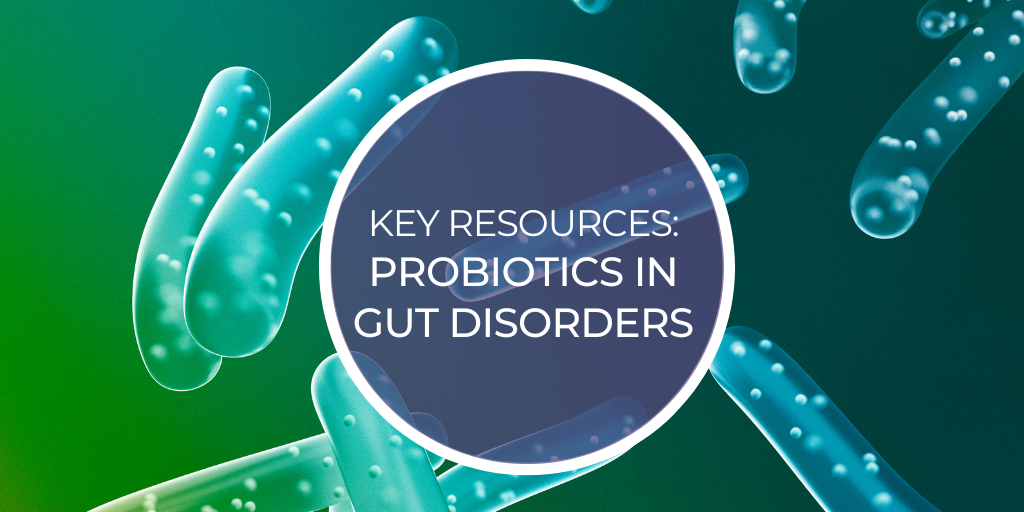Following on from our webinar ’Probiotics in the management of gut disorders’, we’ve pulled together some of the key resources and references discussed within the webinar. If you missed the live webinar, you can register to watch the recording.
GUIDELINES AND KEY REPORTS
British Society of Gastroenterology Guidelines on the Management of Irritable Bowel Syndrome (2021). British Society of Gastroenterology.
ACG Clinical Guideline: Management of Irritable Bowel Syndrome (2021). Brian et al. The American College of Gastroenterology graded evidence
AGA Clinical Practice Update on the Role of Diet in Irritable Bowel Syndrome: Expert Review (2022). Chey at al.
Irritable Bowel Syndrome in Adults: Diagnosis and Management (2008, updated 2017). National Institute for Health and Care Excellence (NICE). Clinical guideline CG61
British Dietetic Association systematic review and evidence-based practice guidelines for the dietary management of irritable bowel syndrome in adults (2016 update). McKenzie et al. Evidence-based guidelines to achieve the successful dietary management of IBS in adults
Evaluation of health and nutritional properties of powder milk and live lactic acid bacteria (2001). World Health Organisation (WHO).
RESEARCH PAPERS
Probiotics for Antibiotic-Associated Diarrhea: What, When, and How Long? (2022). Ferguson and Taylor.
Probiotics and synbiotics in chronic constipation in adults (2022). Alice Van Der Schoot. A systematic review and meta-analysis of randomized controlled trials
Strain-specific and outcome-specific efficacy of probiotics for the treatment of irritable bowel syndrome (2021). McFarland et al. A systematic review and meta-analysis showing that certain probiotics may improve response to treatment, stool frequency and integrative constipation symptoms, providing cautious optimism for their use as a dietary management option
Probiotics for the prevention of pediatric antibiotic‐associated diarrhea (AAD) (2019). Guo et al. Risk of AAD reduced by 55% (AAD in 12% of treatment vs 19% control group)
Probiotics for the prevention of antibiotic-associated diarrhoea (2021). Goodman et al. A systematic review and meta-analysis. Risk of AAD reduced by 37% with co-administration of probiotics compared to control
Systematic review with meta-analysis: the efficacy of prebiotics, probiotics, synbiotics and antibiotics in irritable bowel syndrome (2018). Ford et al.
Probiotic use in at-risk populations (2016). Sanders et al. Consideration of at-risk groups where caution is needed for taking probiotics
Probiotic beverage containing Lactobacillus casei Shirota improves gastrointestinal symptoms in patients with chronic constipation (2003). Koebnick et al. The study indicates a beneficial effect on gastrointestinal symptoms of patients with chronic constipation
OPTIBAC

Webpage. Includes information to check probiotic supplements and ingredients
Probiotic Professionals – Resources for healthcare professionals including the professional probiotics database
Probiotics strains explained by a microbiologist. Dr Kate Steed
Best probiotics for constipation.
Contact the Optibac HCP team for further support and training resources
BDA GASTROENTEROLOGY SPECIALIST GROUP

@bda_gastro (Twitter) and @bda_gastro (Instagram) for the group
PRACTICAL RESOURCES
Please see above under ‘Optibac’ for additional practical resources
Probiotics and Gut Health (2022). BDA. Food fact sheet

Fermented Foods (2019). BDA. Food fact sheet
Do all fermented foods contain a probiotic? ISAPP. Only some fermented foods contain microbes that meet the strict criteria to be called a ‘probiotic’

Clinical guide to probiotic products available in USA. AEProbio. Probiotic guide with evidence ranked 1-3, highest level is at least 1 high quality trial showing superiority to placebo
SOCIAL MEDIA
@realfood_doctor (Twitter), Bridgette Wilson (LinkedIn) and realfooddoctor (Instagram) for Dr Bridgette Wilson, Clinical and Research Dietitian (Webinar Speaker)
Optibac (Instagram) for Optibac
RELATED MYNUTRIWEB CONTENT
Eating to Improve Gut Health – Do We Need to Eat 30 Plant Foods Per Week? (2022). Blog post by Dietitian Kaitlin Colucci

The Diversity Diet (2022). Book Club with Dr Megan Rossi focusing on the diversity diet for gut health
The Low FODMAP Diet in IBS (2022). Webinar with Bridgette Wilson
YOU MAY ALSO BE INTERESTED IN:
MIND AND GUT
THE LOW FODMAP DIET IN IBS
IBS – DIETARY AND HOLISTIC MICROBIOME
We hope you find these references and resources helpful. If you have benefited from our webinar, please consider supporting us by providing a small donation to help contribute the costs of running our programme. We are grateful for any support in funding our mission to improve the health of the people and our planet.






